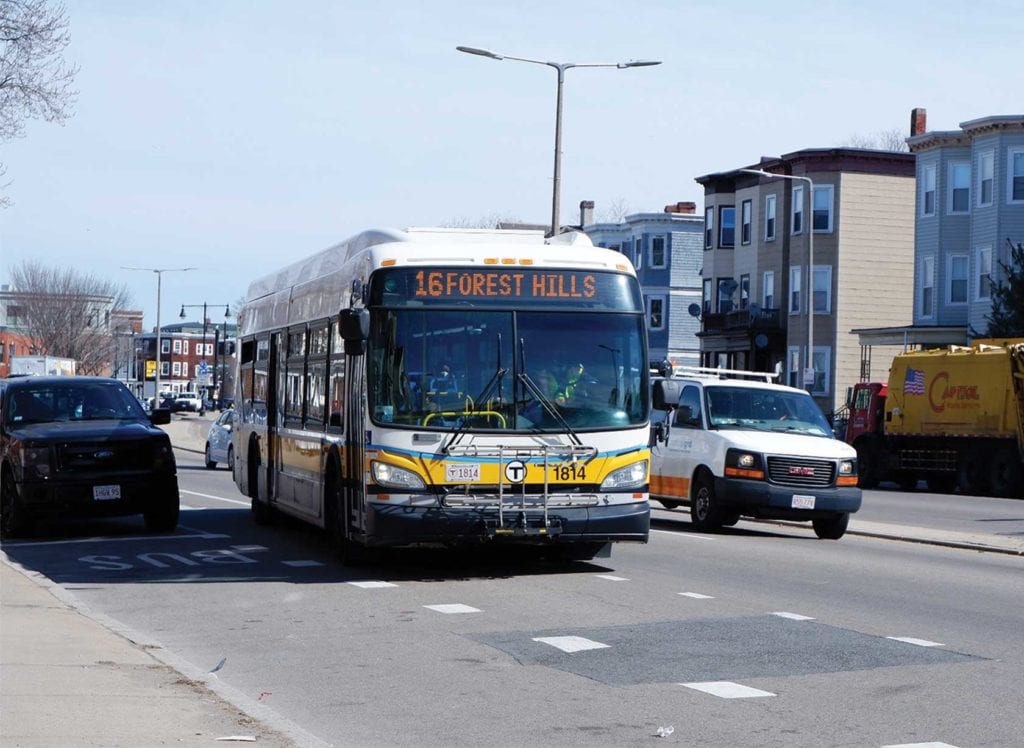
President Biden has announced his $2.2 trillion infrastructure plan, a financially ambitious offering that targets transit among other sectors. Biden wants to bring $85 billion to existing public transit, which for Massachusetts could provide opportunities for expansion and improvement of the MBTA’s the commuter rail and bus systems.
Here’s what two local transit experts suggested the MBTA do with potential federal funding:
Chris Dempsey, director, Transportation for Massachusetts (T4MA)
“We’re big believers in the future of the bus and the need to improve bus service for people that ride it today, as well as to make it an attractive option for transit riders of the future,” Dempsey said, “because it’s such a cost-effective solution relative to rail and other transit options. It allows the T to serve so many more people.”
T4MA focuses on influencing federal and state policy to make transit safer and more environmentally friendly.
“Anyone that rides the bus today, and I’m one of these folks, knows that buses get crowded, they get stuck in traffic. Yes, it doesn’t necessarily feel like an efficient experience, but when we do things like have dedicated bus lanes, when we enable things like all-door boarding, then we start to improve those trips and speed up those trips. The provisions in this bill can help make that possible,” Dempsey said.
The MBTA tested out all-door boarding on the Silver Line in 2017 and resumed it briefly in 2020 when fares were paused for the pandemic emergency. This is meant to reduce the amount of time it takes to board passengers, speeding up trips.
One example of a major center bus lane project is the proposed plan for Blue Hill Avenue. The MBTA plans to add center bus lanes to three miles of road between Mattapan and Roxbury, which could potentially speed up crowded lines like the 22 and 28, while eliminating some vehicle travel and parking spaces. The city was denied federal grants for this project last year, but new funding through the infrastructure bill could change that.
The Boston Transportation Department has begun construction of center-running bus lanes on Columbus Avenue, another project that would address service problems to communities of color. The lanes would not reduce other vehicle travel but would get rid of some parking in order to provide dedicated lanes for the 22, 29 and 44 buses.
Jarred Johnson, executive director, TransitMatters
“The MBTA has already engaged riders on a number of initiatives. Now is the time to use federal funds to make it happen; the T risks losing the confidence of riders by constantly engaging them and being slow to actualize plans,” Johnson said.
TransitMatters advocates for a more equitable experience for MBTA riders. Specifically, the group supports updated fare policies, overnight transit service and modernization of the commuter rail.
TransitMatters wants the MBTA to use funding to connect the Red Line to the Blue Line at Charles/MGH, a move they say would connect riders in East Boston and Dorchester to Logan Airport, Mass General Hospital and the upcoming Suffolk Downs development.
The group also has a detailed proposal to update the commuter rail by prioritizing electrification, upgrading the tracks and signals, and adding new stops, all of which could speed up service and reduce carbon dioxide emissions.
“The T needs to release a five-year capital plan and actually start working towards bus transformation and electrification, regional rail transformation, Red to Blue and other transformative projects,” Johnson said.
The state has approved updates to the Fairmount Line on the commuter rail, including eight more weekday daily trips, earlier starts and later closings, and new fare reader machines for CharlieCard and Senior Pass users. It is part of the Go Boston 2030 plan.
“Telling riders on the Fairmount Line or on the EJ [Environmental Justice] Corridor in Lynn to wait until 2030 is not acceptable. Continuing to buy diesel buses and not committing to a timeline to electrify buses is a failure,” Johnson said.
The president’s infrastructure proposal is becoming a viable option for future funding of these projects, should it receive support from Congress. The MBTA is currently taking advantage of $250 million from the last federal stimulus package, which came in the midst of service cuts.






